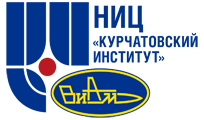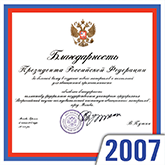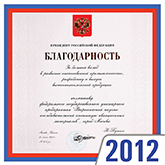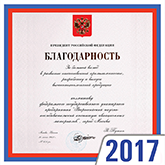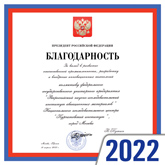ALL-RUSSIAN SCIENTIFIC RESEARCH
INSTITUTE OF AVIATION MATERIALS
INSTITUTE OF AVIATION MATERIALS
+7(499) 261-86-77
admin@viam.ru
PERM: METALLURGY IS IN THE LIMELIGHT
PERM: METALLURGY IS IN THE LIMELIGHT
On March 30, 2016 Olga G. Ospennikova, Head of scientific-research bureau «Heat-resistant cast and wrought alloys and steels, protective coatings for GTE components» of the All-Russian Scientific-Research Institute of Aviation Materials (VIAM) took part in a meeting on development of production of high repartitions in ferrous and non-ferrous metallurgy. The meeting, which was held on the platform PJSC “Motovilikhinskie Zavody” (Perm), was chaired by Dmitry A. Medvedev, Prime Minister of the Russian Federation.
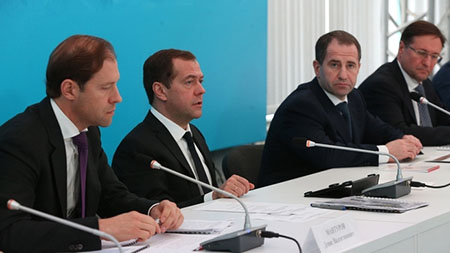
Opening the meeting, Prime Minister pointed out, that metallurgy was the second significant Russian branch of industry after oil one. According to the results of 2014 the share of the branch in industrial production amounted to 13%. In the global market Russia is taking a high place in a number of areas. According to Dmitry Medvedev, multidirectional tendencies had been observed for the last 5 years in metallurgical industry: ferrous metallurgy had increased and non-ferrous metallurgy had reduced. As reported by him, production of steel pipes had increased by one quarter, while aluminum production had decreased by 10% and furthermore some inefficient fields of production had been closed only for the period from 2010 to 2015. “The situation also was difficult in 2015, it was becoming worse with due consideration of general tendencies and metallurgical ones, - Dmitry Medvedev added. – Prices for non-ferrous and ferrous metals have sharply declined”.
According to him, there were a number of reasons to continue reducing production targets. Firstly, it was reduction in domestic demand. Dmitry Medvedev presented statistics according to which volume of rolled metal consumption in the domestic market for ferrous metals had fallen by 9% in comparison with 2014. The second reason had become practically exhausted potential for growth of exports of metallurgical products. As the third factor, he called unfavorable price situation in the world markets on the whole, where the fall on the main ferrous metals had amounted about 40%, on aluminum – more 20%, cooper – 28%, nickel – up to 45% in December 2015 by December 2014.
“Preservation of quantum of exports is very difficult, but important task in such conditions. Of course we should solve this task in industry, but at the same time we should think how to increase supplies of metal products in the domestic market, expanding its application in all sectors of economy”, - Dmitry Medvedev concluded.
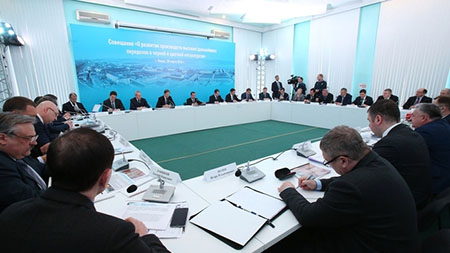
“Additive technologies and 3D-modeling are one of the most needed areas both in defense-industrial sector and in civilian one, - Denis V. Manturov, Minister of Industry and Trade of the Russian Federation pointed out in his speech. – Experts estimated that market volume of developed technologies was expected to increase at least twofold. However, more advanced domestic technologies (e.g. technology of hybrid shaping of coaxial and selective laser melting) are being developed today in Russia.” “Concerning these areas it is necessary to consider the possibility to establish consortia with the participants of developers, manufacturers and consumers which would be implemented within the framework of specific investment contract”, - Head of department reported.
According to him, corresponding regulatory framework is being formed almost starting from scratch in order to stimulate the application of additive technologies. For this purpose Rosstandart with the support of VIAM established a separate technical committee, which is developing 10 basic standards in this field.
In turn, Olga Ospennikova reported that it was necessary to develop powder metallurgy in the Russian Federation, because it was one of the most important elements to implement additive technologies into industry. “At present additive technologies are actively developing. There are three levels of their implementation: the first level is auxiliary production, the second – production of demonstrators, and the third – pilot and batch production of details, meeting design documents requirements for application in working equipment specimens”, - she declared.
Besides, according to her, all three levels of implementation of additive technologies were poorly provided with materials of Russian production. The exceptions were metal powder compositions, produced at VIAM (alloys based on nickel, titanium, aluminum, cobalt, iron).
But at the same time Olga Ospennikova pointed out, that active work on implementation of additive technologies into industry were being performed thanks to Minpromtorg of Russia.
In particular, she reminded that the Technical Committee for Standardization TC №182 “Additive technologies” had been established on the basis of VIAM last year and a project of the first GOST had already been submitted for consideration. Besides, Scientific and Technical Council on development of additive technologies in Russia had been established by order of the Minister of Industry and Trade of the Russian Federation. “The first meeting of the Council was held in January 2016, at which a decision was made to form a working group to create roadmap of development of additive technologies”, - Olga Ospennikova explained. According to her, at present the basic measures of state support for development of additive technologies were determined. At that, scientific and production project consortia should become the basis for successful realization of projects aimed at the introduction of additive technologies.
In her report, Olga Ospennikova also spoke about developed at VIAM additive manufacturing of full cycle, which included development of powder compositions, 3D-models, design of supports of synthesis technologies. “Established infrastructure allows, as fast as possible, to develop technologies and to produce parts, meeting the requirements of regulatory documents”, - she pointed out.
According to her, the first successful experience of introduction of additive technologies was the development of front combustion chamber swirler of advanced engine PD-14. “The challenge for the future is to produce combustion chamber completely by using additive technologies”, - Olga Ospennikova declared.
